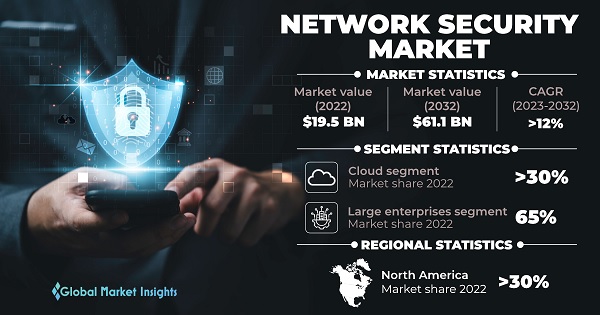Home > Media & Technology > Security and Surveillance > IT Security > Network Security Market
Network Security Market Size
- Report ID: GMI7252
- Published Date: Nov 2023
- Report Format: PDF
Network Security Market Size
Network Security Market size was valued at USD 19.5 billion in 2022 and is estimated to register a CAGR of over 12% between 2023 and 2032. The surge in cyberattacks is propelling the market. With the rise in frequency and complexity of cyberthreats, organizations are concentrating on strengthening their defenses as a top priority. The escalating risk landscape has prompted investments in advanced security solutions, including firewalls, intrusion detection systems, and endpoint protection. This surge is driving the demand for innovative technologies and services to combat the evolving threats.

For instance, in September 2023, cybercriminals targeted the Kuwait Ministry of Finance with a phishing ransomware attack. This targeted assault aimed to infiltrate and encrypt sensitive data, leveraging phishing tactics to extort payment in exchange for restoring access to the encrypted information.
| Report Attribute | Details |
|---|---|
| Base Year: | 2022 |
| Network Security Market Size in 2022: | USD 19.5 Billion |
| Forecast Period: | 2023 to 2032 |
| Forecast Period 2023 to 2032 CAGR: | 12% |
| 2032 Value Projection: | USD 61.1 Billion |
| Historical Data for: | 2018 to 2022 |
| No. of Pages: | 250 |
| Tables, Charts & Figures: | 340 |
| Segments covered: | Type, Deployment Model, Organization Size, and End-user |
| Growth Drivers: |
|
| Pitfalls & Challenges: |
|
The introduction of stringent data protection and privacy regulations compels businesses to prioritize network security. Compliance with these regulations demands heightened data protection measures, fueling the demand for comprehensive security solutions. The Indian government introduced the Digital Data Protection Act 2023 in August, which is a comprehensive legislation aimed at safeguarding personal and sensitive digital information. It establishes guidelines for data collection, processing, and storage, ensuring user privacy and imposing strict measures on the entities handling data. The act emphasizes transparency, user consent, and security protocols, holding organizations accountable for data protection and imposing penalties for non-compliance.
The complexity of security solutions presents challenges in the network security market. The diverse range of security tools, each with its interface and functionality, makes integration and management intricate. Compatibility issues between different solutions hinder seamless operation. The need for specialized expertise to configure and maintain these diverse systems adds to the challenge. Simplifying and streamlining these solutions while ensuring comprehensive security measures remains a significant challenge for organizations in the network security landscape.
